Are the French in Danger in Auroville?
- 4 min read
As a community that aims to be inclusive and diverse, Auroville has to recognize the need to decolonize and address the legacy of colonialism within its own structures and practices.
There are several reasons why decolonizing Auroville is important.
Firstly, Auroville was founded for people from various parts of the world, and it is important to acknowledge that some of them may have brought with them colonial attitudes and biases. Decolonization can help to identify and address these attitudes, and promote a more inclusive and equitable community.
Secondly, Auroville is located in India, a country with a complex history of colonization and decolonization. Auroville’s location and relationship with the local community is important, and decolonizing Auroville can help to create a more respectful and mutually beneficial relationship with the surrounding communities.
Thirdly, Auroville has its own unique culture, and decolonizing can help to promote a more diverse and inclusive community culture. This can include re-evaluating language, education, and cultural practices to ensure that they are not based on colonial biases or perpetuating colonial legacies.
Overall, decolonizing Auroville is important to create a more inclusive, equitable, and sustainable community that respects and acknowledges the complex history and diversity of the region. The decolonisation of Auroville is a complex and ongoing process that requires the participation and collaboration of all stakeholders. It involves challenging historical power dynamics, promoting cultural diversity and inclusivity, and re-evaluating policies and practices to create a more equitable and just community.

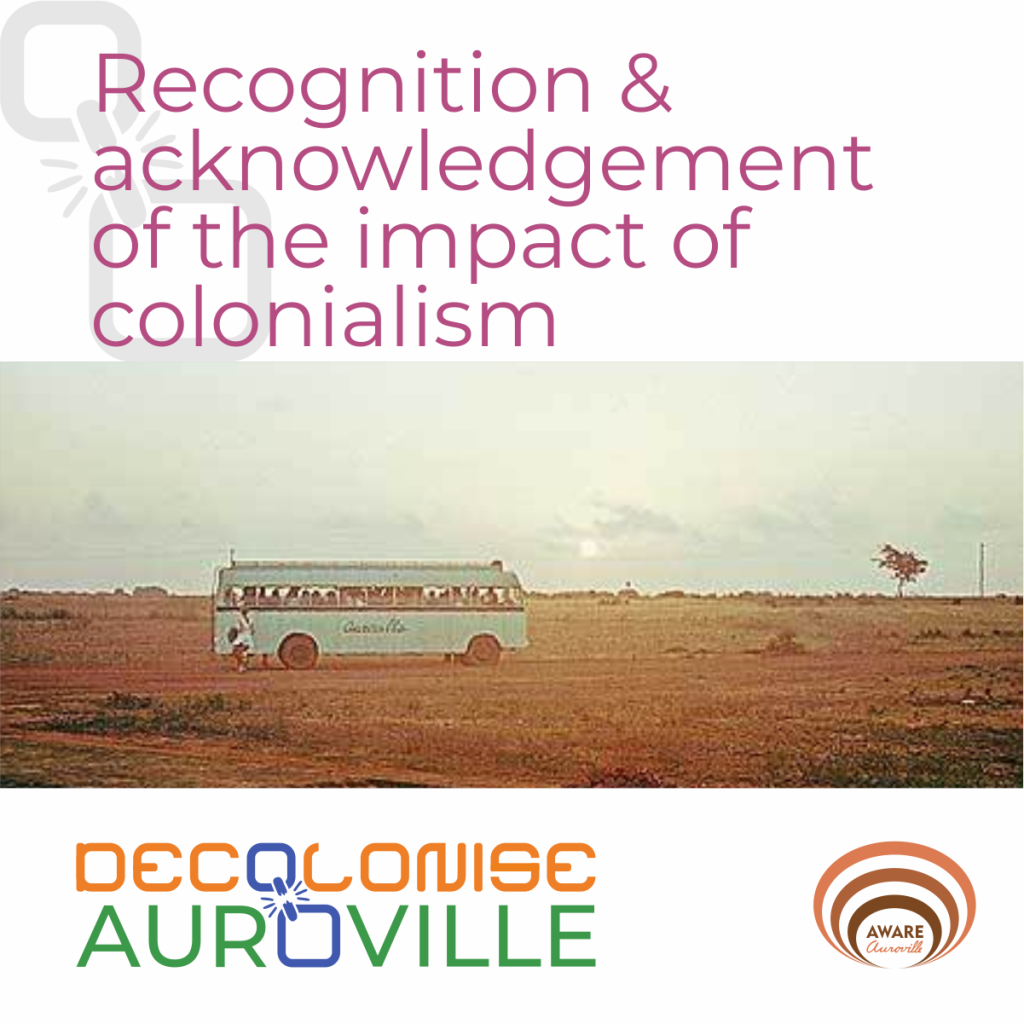
The first step in the decolonisation process is recognizing and acknowledging the impact of colonialism on Auroville’s development. This requires a critical examination of the community’s history, including the ways in which colonial attitudes, practices, and structures may have influenced its development. This may involve efforts to redress historical injustices and to promote more equitable resource management practices.
In general the attitudes of a few from countries with colonising legacies, continue to be patronising and their intentions missionary. Perhaps, most of it is subconscious or unconscious. However the result remains the same. Even the nomenclature of the initial days are colonial in nature. They call themselves ‘pioneers’. Pioneers of what? The ego of the colonials pressurises them to call themselves pioneers of the new world. If at all, it was the Mother who conceived the idea and pioneered the project. The earlier ones were the first set of guinea pigs. Nothing more.
On top, they shamelessly call the land of Tamilnadu, a DESERT. They endlessly sell this story to glorify themselves.
Decolonisation involves promoting the inclusion of all communities into our fabric of social life within Auroville. Look at all the general meetings. It is a shameless form of colonial framework. The reset may involve providing opportunities for communities other than Europeans to participate in decision-making processes and access resources and services within the community, as well as addressing issues such as class systems, cronyism and access to basic needs.
Decolonisation involves addressing systemic inequalities that are the legacy of colonialism within Auroville. This may involve promoting social justice initiatives that aim to address issues such as economic and social disparities, discrimination, and unequal access to resources.
For some, living in Auroville feels like living in a fascist society. Any disagreement or challenge to the colonials point of view is a big no-no. A few who stand up are hounded at each step of their life. Cockroach stickers are used to mark and publicly humiliate the individuals who have a different opinion. The colonials brand the individuals as ‘WASTE’, and depending upon their courage and resolve, are categorised into various types of waste – hazardous, recyclable, recyclable, etc. and put up the posters in public places to name and shame them. These are all tangible results of subtle colonial undercurrents.
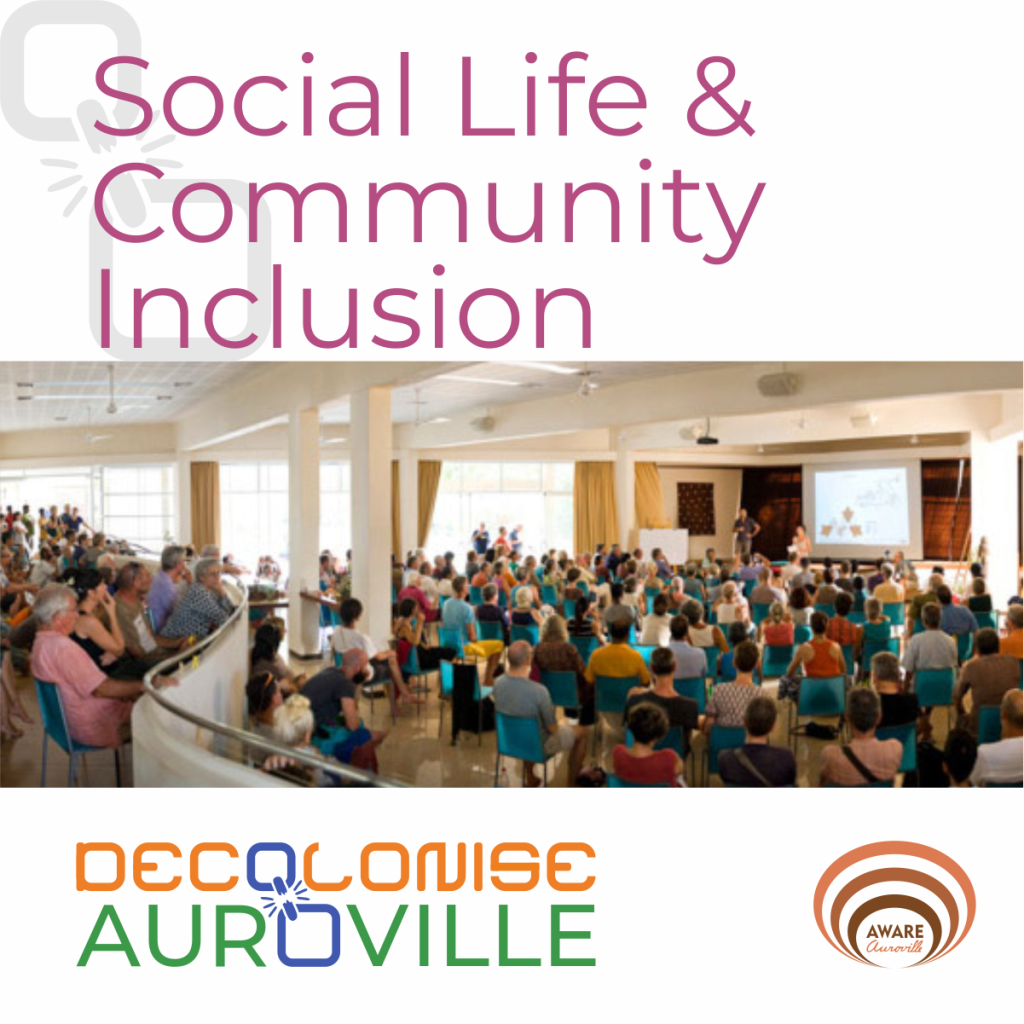
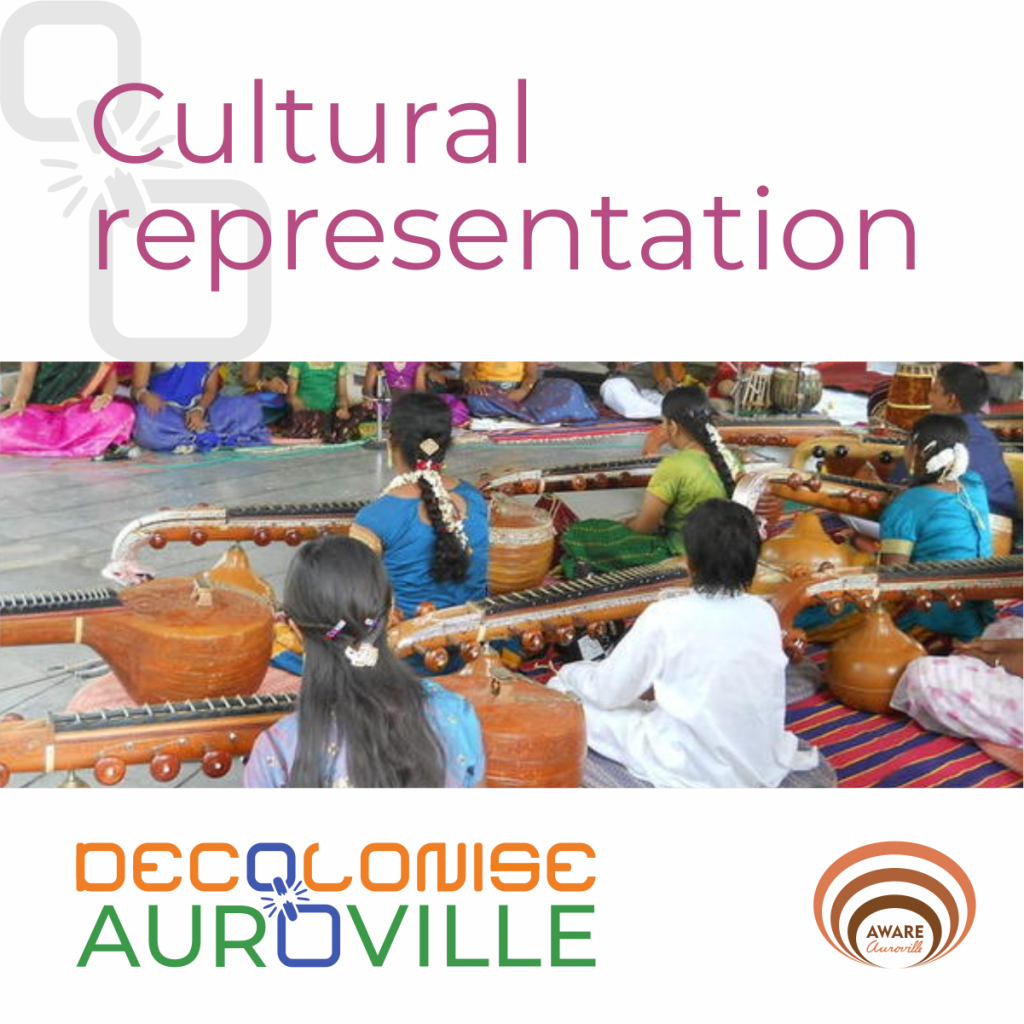
Auroville aims to be a model of human unity and diversity, but its cultural practices have been shaped by the historical context of colonialism. Decolonising Auroville requires an examination of the ways in which colonialism has influenced cultural representation within the community, including the inclusion of diverse cultural practices and the promotion of cultural understanding and respect.
However, the community’s development has been shaped by Eurocentric perspectives, which have marginalized other cultural identities. The decolonisation process could involve promoting the inclusion of marginalized communities and cultures, as well as supporting efforts to preserve and celebrate cultural diversity within the community.
Education is a critical aspect of decolonisation, as it shapes the way individuals understand and interact with the world. Decolonising Auroville involves promoting a more inclusive and culturally diverse educational system, including efforts to incorporate local languages and knowledge systems. This may involve addressing historical injustices in education and supporting efforts to promote linguistic and cultural diversity.
The decolonisation process could involve examining and transforming Auroville’s education system to promote a more inclusive and diverse curriculum that reflects the diverse cultural perspectives of its residents. This could also involve promoting critical thinking and awareness of colonialism and its impact on society.
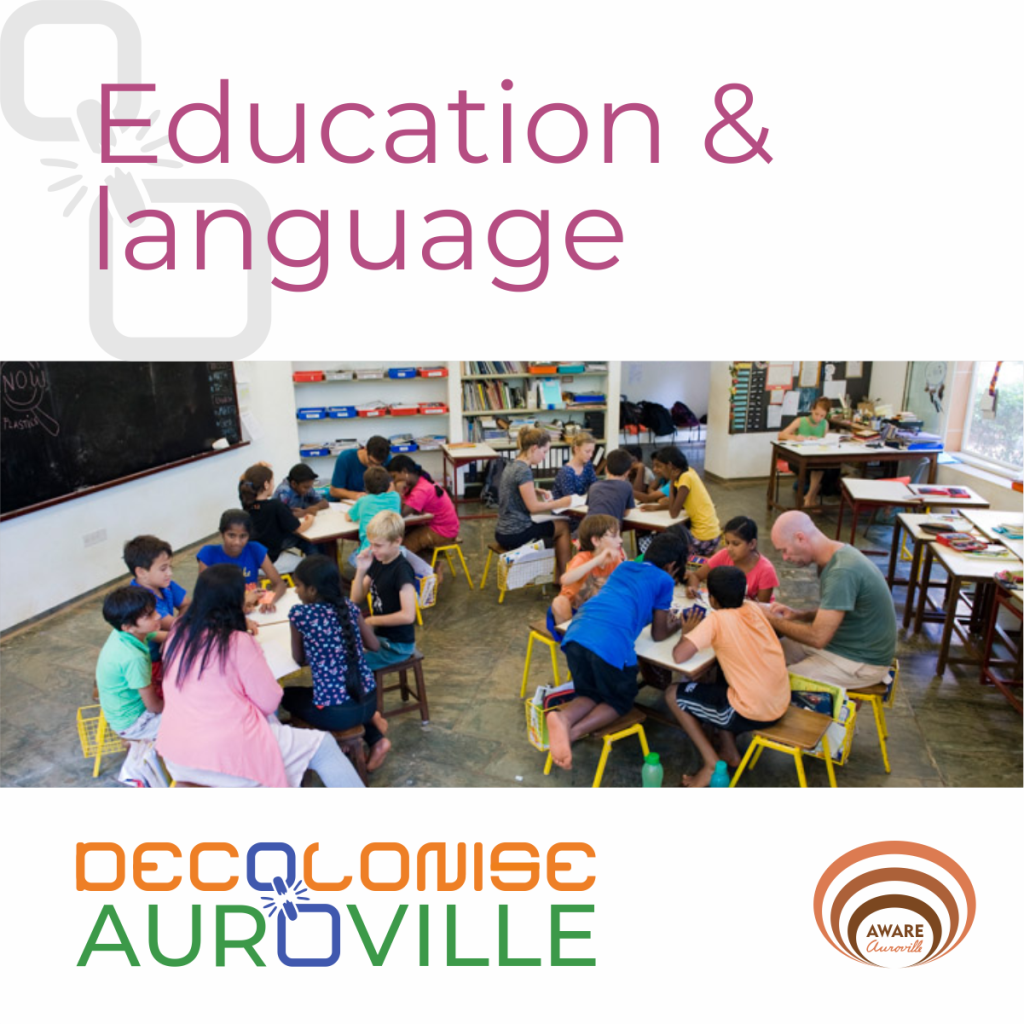
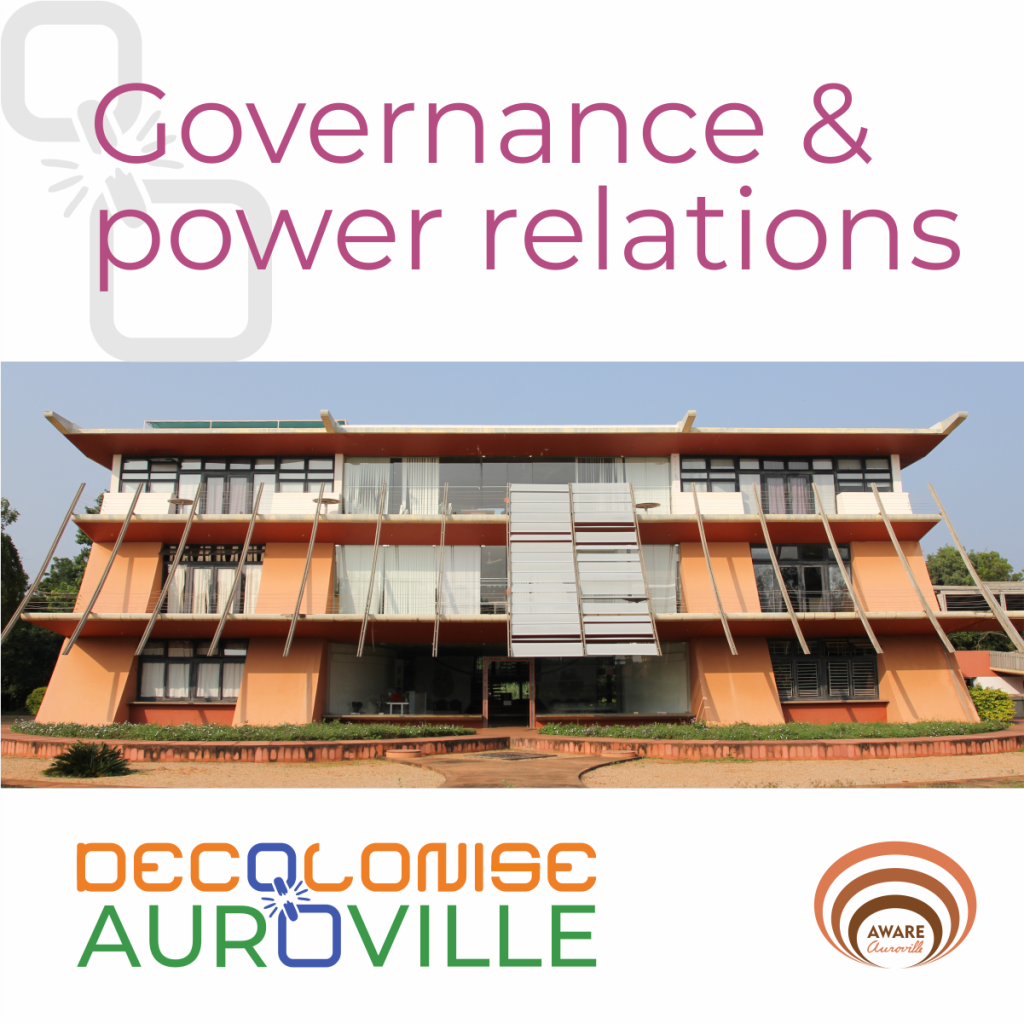
Decolonising Auroville requires an examination of the community’s governance structures and power relations, particularly in relation to the historically marginalised groups. This may involve promoting greater participation and representation of historically marginalised communities in decision-making processes and addressing power imbalances.
The decolonisation process could involve addressing historical injustices that have resulted from colonialism. This may include addressing the inequalities in access to resources, land ownership, governance models and power, as well as acknowledging the cultural erasure that has occurred.
Decolonisation of governance involves examining and challenging the ways in which colonialism has influenced governance structures and decision-making processes within Auroville. This may involve promoting more conscious and inviting decision-making processes, as well as supporting efforts to address power imbalances within the community. The existing RA rules, regulations, and community processes are agreed and approved by the colonial administration of the past. The general population have no idea about the decisions that are being made in the name of Residents’ Assembly.
The decision of the RA to remove four Indian members of Working Committee, using their colonial processes was a stark example of the way the colonials operate, perpetuate power, and penalise the ones, whom they dislike.
Auroville was established on land that was previously used for agriculture and grazing, and its development has involved significant land-use changes. Decolonising Auroville requires a critical examination of the community’s land-use practices, particularly in light of the broader context of land dispossession and displacement that has characterized colonialism.
The Auroville lands thus acquired for manifesting Mother’s plan, were soon turned into selfish estates, branded as forests for personal use, posh colony of bunglows in spaces like Auromodele, Aurodam, Certitude, etc.
This is a double whammy for the locals. One, we disrobed them of their only possession, and turned them into landless labourers. Two, instead building a City with simple and beautiful life, we build gated communities with security guards, to build grand, larger than life lifestyles. To further tease the locals and put them down. Instead of finding solutions for the difficulties of the world, we further exasperated the difficulties for the dispossessed. However, we are not that bad, we’ve given the dispossessed locals some jobs, which pays if they clean our toilets.
Decolonising Auroville could also involve addressing the ways in which colonialism has shaped land use and resource management practices. This could involve re-evaluating the community’s land use policies and promoting sustainable and equitable resource management practices.
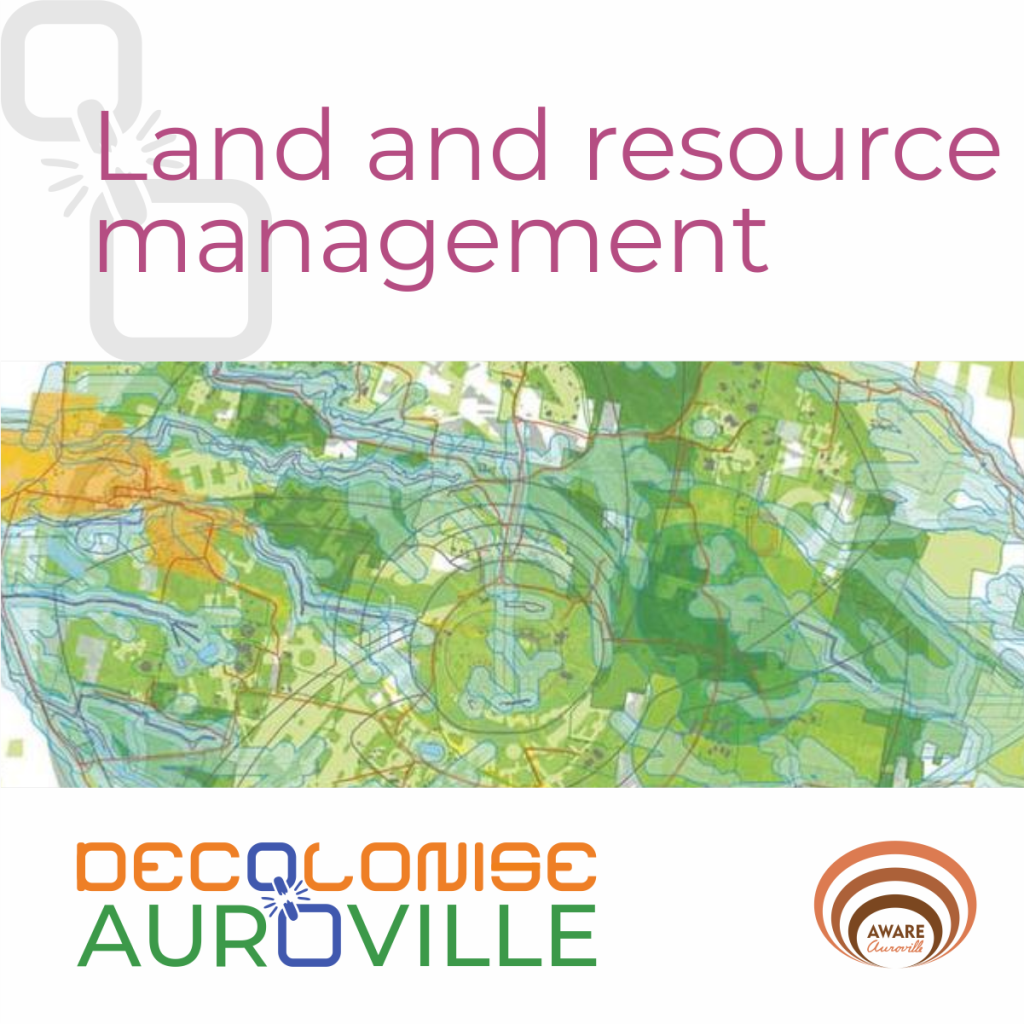
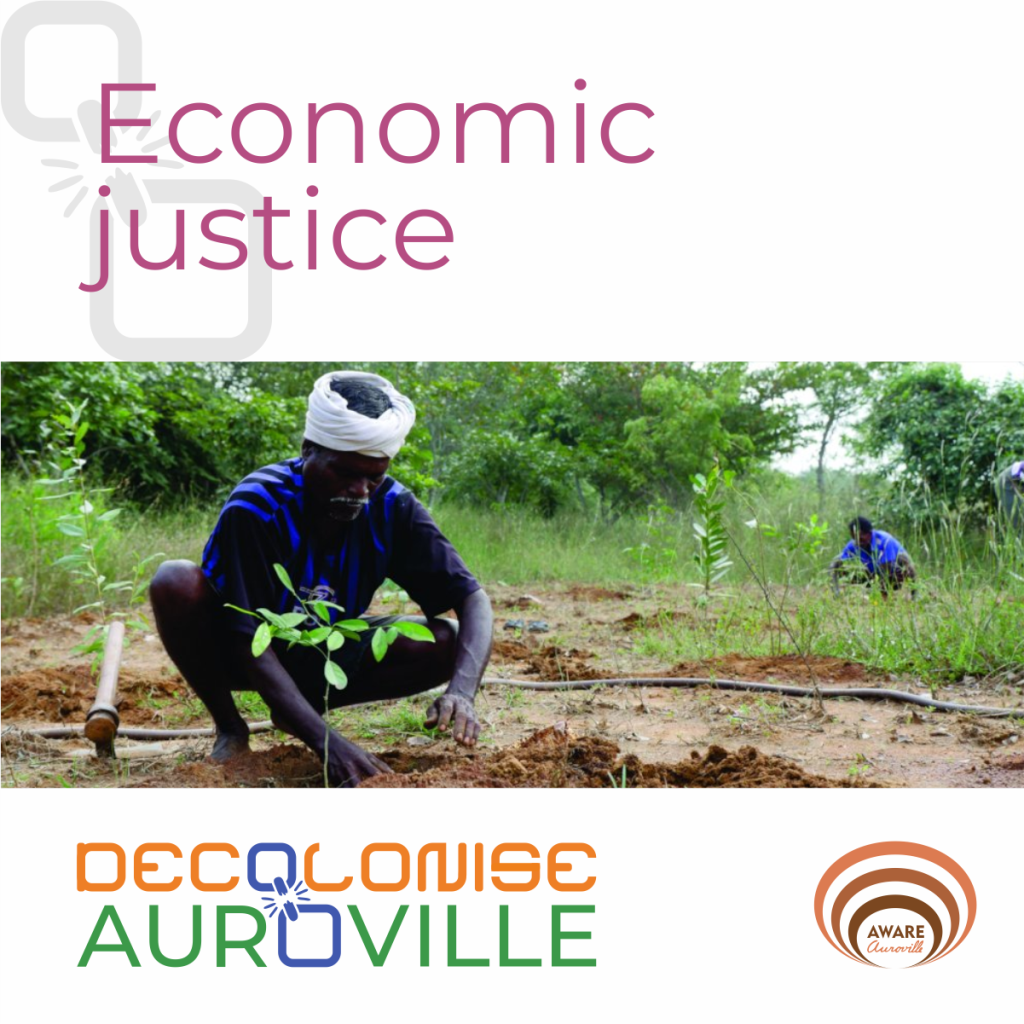
Economic systems have been historically shaped by colonialism, and the decolonisation of Auroville requires an examination of the community’s economic practices and structures. This may involve promoting more equitable economic systems that address historical injustices and support the economic empowerment of historically marginalised communities.
Decolonisation involves addressing economic disparities within Auroville that are the legacy of colonialism. This may involve promoting economic justice initiatives that aim to address issues such as poverty, inequality, and unequal access to resources and opportunities. Decolonisation involves promoting fair trade and local economies within Auroville. This may involve supporting initiatives that prioritize local production and consumption, as well as promoting fair trade practices that ensure equitable compensation for workers and producers.
We oppress the marginalized ones with the tyranny of maintenance, however, the colonials always run the network of trusts and unit that perpetuate their control over the economic prospects. The community approved processes are such that the Europeans stay on top of the food cycle and control the resources that comes in or goes out. The colonials have managed a system where they are always the boss and Indians are forced to work under them, in the name of volunteership, newcomership, or youhavenowayoutship. However, seldom can one find the Europeans working under any Indian-run entities. The colonials believe that working under Indian-led enterprise is in someway demeaning and belittling.
Decolonisation involves promoting entrepreneurship opportunities within Auroville. This may involve supporting incubation programs that equip individuals with the skills and knowledge needed to create sustainable and equitable businesses, as well as providing support and resources for entrepreneurial ventures that prioritize social and environmental impact.